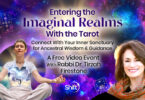Guest Writer for Wake Up World
There is a conceptual trend arising in the current resurgence of polyamory, or non-monogamy, in the western world. Polyamory has begun to be promoted somewhat evangelically as the ‘solution’ to the ‘problem’ of monogamy. Is this the result of our culture once again swinging the pendulum too far as we all jump on the bandwagon?
Both polyamory and monogamy have their benefits and both have problems. This trend of promoting polyamory as ‘better’ is often based on comparing it to the cultural paradigm surrounding monogamy. This is a mistake in my opinion because the current cultural paradigm of monogamy is broken and not representative of its potentials. In bifurcating the discussion of relationship styles to ‘polyamory’ and ‘broken monogamy’ we make the comparative benefits very one-sided to polyamory. This in turn can alienate people who are disillusioned by the conventional monogamy paradigm, but are not polyamorous.
My hopes are that with this article we can explore the potentials monogamy has to offer and redesign the broken paradigm societal example is feeding us. Please note: at no point am I attempting to say one style is better than the other, or create a ‘vs.’ type discussion.
[pro_ad_display_adzone id=”110028″]
This recent cultural expansion of polyamory has come with a lot of quality research and discourse supporting its legitimacy. A necessary process due to the strong cultural opposition it faces within a society founded on a puritan Christian value system. Polyamory has pushed hard to establish its legitimate right to be accepted within our society, which is greatly deserves to be. Recent anthropological research even shows us that polyamory holds a strong part in our history, biology and natural evolution as human beings. However, in polyamory’s ‘pushing for’, the trend to ‘push against’ monogamy has gotten strong and understandably so. The germinating seedling needs to push hard to break through the concrete floor of the urban jungle, if it is to grow. But it seems now that there is a cultural fad to discuss monogamy as something ’un-evolved’ or ‘less’ than polyamory. But is it?
Unfortunately, the ‘monogamy’ model that polyamory has had to push against to find its place in culture is not really monogamy. Monogamy is simply the practice or state of having a sexual relationship with only one partner. However, ‘monogamy’ is often used as an interchangeable term to discuss the ongoing problems present in society’s twisted marriage paradigms. Herein lies the problem with many of the current ‘polyamory vs. monogamy’ arguments.
Monogamy is looked at as though it is only the expression we see within the institution of marriage in western society at this time. But this current institution is a broken monogamy, in many ways forced down upon us as means of control. It manifests as very unhealthy in the lives of the unconscious majority: co-dependence, jealously, passiveness, resentment, violence, a sense of being trapped, and becoming uninspired in love and sex. Many of these issues aren’t born of the choice to stay with one person, but of the abundance of immaturity and assumption, and a lack of self-awareness with which the average person enters a monogamous relationship.
This is where polyamory has offered me – and many others – a great opportunity to cultivate valuable self-awareness and maturity within relationships. Polyamory requires a strong commitment to communication, honesty, maturity, emotional awareness and respect for one’s self and one’s partner. These are vital elements in a monogamous relationship as well, but being that we unconsciously enter the established paradigms of monogamy with so many cultural assumptions, it is easy to let these elements fall from the foreground. In turn, we see the failings of monogamy/marriage so blatantly. Monogamy doesn’t need to be this way, but in order for it to change, we need to discover a different paradigm for it. We need to change the way we interact with it.
The paradigms of monogamy we are offered automatically in western society are a toxic mimic of spiritual union, stripped of its meaning and instituted as a system of psychological and political control around the advent of agricultural society. Let’s try to let that paradigm go for a minute. The paradigm of monogamy and marriage I am offering here is spiritually based. This would understandably put it at odds with conventional anthropologists studying animals, the hedonistic past of humanity and those who see sex and relationship without the perception of it as a spiritual practice.
Sexual energy/libido is an experience of the divine creative force of the universe from which we can create new life, either into a new being on this planet (ie. a child) or in each other through the mutual cultivation and channelling of this energy. Our romantic relationships are an opportunity to work as mirrors for each other, to grow in self-awareness, healing of past wounds, and deepen into love through increasing intimacy and trust. The practice of sex (read: love making) is the sacred dance of sexual energy between two that elevates consciousness through sensual bliss towards one, God, enlightenment, transcendence, etc. We can work as conscious partners helping each other towards spiritual awareness through sexual union and relationship. Of course, this could apply to all romantic relationships, not just monogamous ones.
Now from this paradigm, let’s look at the potential of monogamy. The pact, promise, commitment, etc. made to a dedicated partner in a monogamous relationship creates a safe space for emotional venerability within the relationship. We can then consciously choose to dedicate our sexual/romantic love energy to be channelled into the partner through this venerable space with the intention of deepening intimacy. This doesn’t mean that there is a total merging into each other in all facets of life (ie. co-dependence), but simply an expression of trust/trustworthiness within the relationship that the other is choosing to protect this venerable space. This trust/trustworthiness builds a deeply intimate bond and enables us to streamline sexual/loving energy into each other at depths and potencies that continue to increase with intimacy and connection.
This increased intimacy and sense of safety within each other makes it much easier for us to trust in opening ourselves up into the venerability of spiritual/sexual/loving surrender, thus allowing us to enter fuller states of elevated consciousness. Unfortunately, this familiarity also makes it very easy to become flat in our desires and uninspired in love. And the venerability opens the avenue for personal shadow/darkness to be triggered out into the relationship. This is why it is very important for both parties to maintain their relationship as a spiritual practice. We must learn to support each other in our processes while also taking personal accountability for what we offer into the relationship, so as to push beyond this tendency towards flatness and decompose the shadows that arise.
From this new paradigm we can look at marriage as a ritual in which an entire community comes together and cultivates love, streamlines it into two people making a covenant/commitment to each other to establish a bond of trust and safety. The ceremony/ritual of marriage works to seal this bond, and then a symbol such as a ring is used as a reminder of this covenant. Trust is required (yes, required, monogamy or not) to stream-line all that love into each other through the act and art of love, so as to awaken each other as oneness, God. The marriage ritual and symbols associated to it work to support this trust. But again, if entered unconsciously or due to cultural expectations, marriage can also work to lock people into destructive exchanges with each other that eventually create deep wounds and all sorts of problems.
We could look at romantic relationship as the practice of ‘two’ coming together in sacred dance to awaken spirit as desire and channel it upwards through each other into transcendent awareness, achieved through loving ecstatic sexual bliss. Wherein the agreement of monogamy or the ritual of marriage work as a symbol of trust in the offering of mutual venerability and loving/sexual exchange within relationship as a spiritual practice towards oneness. This is clearly not what is instituted into society, recognized in the conventional paradigm of sexuality, or taken into account by many who are downing monogamy as “un-evolved” in some way. But this paradigm is functional and alive in the world.
Again, in no way am I offering a ‘vs.’ argument or claiming that the sexual union/bliss states discussed here are exclusive to monogamy in any way; trust bonds and energetic exchanges of a similar calibre can be offered within polyamorous relationships as well. I am offering that within conscious monogamy, the ability to create these safe-space trust bonds can enable us to feel more secure in offering the venerable heart surrender needed to achieve the aforementioned states of awareness. As well as setting the energetic structures surrounding the relationship to encourage and channel more sexual energy into each other through reserving it for the partner – which means much more than not having sex with other people. This last point is important because sexual energy is not infinite, as the body is not infinite. The physical resources required to cultivate this desire deplete over time, especially if they are tapped out through unconscious sexual gratification, a topic for another article.
Both polyamory and monogamy have their trials, challenges and tribulations as well as their gifts, benefits and solutions. It is focusing on these elements in discourse without demonizing and battling between relationships styles that will really help empower each other – and our species – towards a fuller expression of our honest selves in love and relationship.
About the author:
James W. Jesso is a Calgary, Alberta based Reiki master, nutritional specialist, author, public educator, and event coordinator who used psilocybin mushrooms and nutritional medicine to heal himself from mental illness resulting from substance abuse. His insightful and engaging book Decomposing The Shadow: Lessons From the Psilocybin Mushrooms presents a complete conceptual and cognitive model for the psilocybin mushroom experience as it pertains to psychospiritual maturation and the healing of mental emotional wounds. In the summer and autumn of 2013 James launched his book and travelled across Canada, sharing his work and experience. He is continuing his writing and teaching journey into his other areas of interest such as nutritional practices, sacred sexuality, and cultivating personal vitality.
Learn more about James’ project and vision at DecomposingTheShadow.com and JamesWJesso.com.
[pro_ad_display_adzone id=”110027″]







